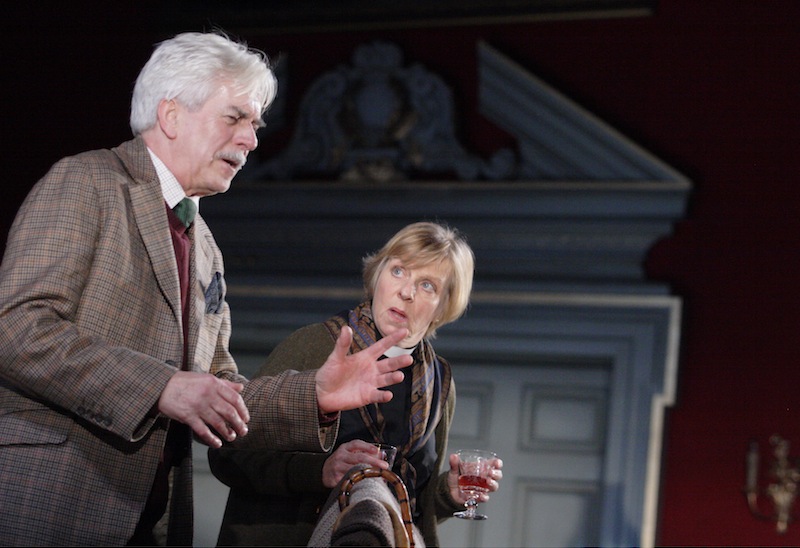The word “people” of the title of Alan Bennett’s new play is to be spat out, like a lemon pip. People, who invade your space, boss your values, make you be what they want. So does the beleaguered Lady Dorothy Stacpoole feel about the stark options facing her as her fantastically grand mansion leaks and crumbles over her smelly, freezing feet, while under it groans ancient mine workings like a whale with toothache. The options are to auction off the contents and house to who-knows-who, to sell via a slimy salesman to “The Concern” (a bunch of invisible super-rich who buy top works of art and estates in order to hide them away from public gaze), to pass on to the National Trust and live on in the house like a relic to entertain the visitors, or to scrap the odd bit of dosh from passing porno film-shoots.
And which would you choose? Bennett’s play feels less like a class comedy than an old man’s rage against the sterility of today’s cautious, over-organised society, where all boxes must be computer-ticked, and all human spirit and oddity processed away. Upending his cuddly reputation, he gives the poor old National Trust a really bloody nose, and there’s been a bit of protest about that in the NT-reading prints such as the Telegraph. Why? Because they are most guilty (says Bennett) of cleaning, sterilising, processing the mucky reality out of houses of centuries of history, putting upgraded mortar-work and deodorised clichés before the capricious and malodorous idiosyncrasy of the humans who actually lived their imperfect lives in the houses.
 People like septuagenarian Lady Dotty, whom we meet among chilly cobwebs, wrapped in moth-eaten mink and acrylic knits, an aristocratic former model now as shabby as Bennett's Lady in the Van. She may catch the leaks from her vast roof in medieval Chinese pots worth fortunes, but they’re leaks nevertheless, and she hasn't a clue how to find the money to plug them and stop being damp, miserable and cold. She's reading 30-year-old newspapers and would only switch on the "wireless" if there were a war.
People like septuagenarian Lady Dotty, whom we meet among chilly cobwebs, wrapped in moth-eaten mink and acrylic knits, an aristocratic former model now as shabby as Bennett's Lady in the Van. She may catch the leaks from her vast roof in medieval Chinese pots worth fortunes, but they’re leaks nevertheless, and she hasn't a clue how to find the money to plug them and stop being damp, miserable and cold. She's reading 30-year-old newspapers and would only switch on the "wireless" if there were a war.
Bennett, with his usual acuity for classic double acts (see Auden and Britten in his last NT premiere, The Habit of Art), sets her up with a “companion”, the lower-drawer, Northern-tongued Iris, even older and shabbier than Dotty is, and far more her sort than the crisp, righteous sister June, who is a lesbian Archdeacon and National Trust member.
Frances de la Tour and Linda Bassett (pictured above right) are a delight as the two crones, playing snooty and mousey just like Robert Helpmann and Frederick Ashton's Ugly Sisters in Ashton’s ballet Cinderella. De la Tour, lofty in manner, and “Lofty” by nickname (yes!!!), has less richness in her script than the indiscreet, timorous Bassett, whose Iris pretty much steals the entire show; but as a duo they’re a treat, dancing to Petula Clark singing “Down Town” and walking tightropes of indiscretion and old-lady innuendo in their conversations.
 The three men who present them with their options are figures from some metaphorical form of medieval morality play, each offering venal temptations. Miles Jupp is cherubic as the oleaginous auction assessor who works for oligarchs on the side, Nicholas le Prevost suavely evangelistic in his tweed and corduroys on behalf of the National Trust, Peter Egan creepy but sexy as the porn film director whom Lady Dotty thinks she once shagged during her modelling career. (Pictured above, Nicholas le Prevost as the man from the Trust, with Selina Cadell as Archdeacon June)
The three men who present them with their options are figures from some metaphorical form of medieval morality play, each offering venal temptations. Miles Jupp is cherubic as the oleaginous auction assessor who works for oligarchs on the side, Nicholas le Prevost suavely evangelistic in his tweed and corduroys on behalf of the National Trust, Peter Egan creepy but sexy as the porn film director whom Lady Dotty thinks she once shagged during her modelling career. (Pictured above, Nicholas le Prevost as the man from the Trust, with Selina Cadell as Archdeacon June)
There are some splendid set-ups - a bawdy porn film-shoot, a stunning make-over for the set (by the great Bob Crowley) from haunted and spidery into glitteringly clean, ready for its paying public. There’s enough situations here for an entire daytime TV series, and the omnivorous Nicholas Hytner directs it with super-smart farcical timing.
By very odd coincidence the house he portrays is Wentworth Woodhouse, where as a child my mother would go and stay
But the characters and the situation seem ripe for something more ambitious than a generalised Reginald Perrin outrage at how "people" today lost the plot. Bennett launches sharp barbs at iPhones and the awesome egotism of the very rich, and invents a stunningly funny feature for the house that seals the deal for the NT man (can’t possibly reveal it, but it is lavatorial humour). There are lines about morality you roll around your tongue. "PST. People Spoil Things" or “Doing the right thing isn’t always the right thing to do." A merciless demolition of the National Trust’s employment policy, “the vast volunteer army doing the job for love, or company, for a cup of tea and a flapjack. Service to the big house. It’s the new feudalism” is counterpointed later by the brisk line from the Trust man, "There is nowhere that is not visitable. That at least the Holocaust has taught us." No wonder the NT is reaching for its croquet mallets.
There are few theatrical amusements more pleasing than Bennett on the linguistic rampage. People makes an expertly entertaining two hours, but it's straining at a gnat. The great house he shows is in Yorkshire, in a mining community, and there are other things to say about its odd juxtapositions and dilemmas, more curious and unpredictable than the creaky Downton Abbey-meets-Country-House-Rescue view that prevails here.
I know, because by very odd coincidence the house he portrays is Wentworth Woodhouse, where as a child my mother and her twin sister would go and stay, invited to the big house because their father was the local vicar, where the affection between house and estate went deep, eluding pat definitions. Bennett's dead right that a glib National Trust with its cafés and garrulousness might be no better refuge for that mysteriously intricate microcosm than a shadowy billionaire buying it up to keep it private, lived-in, peculiar. One can see the attraction of porno film shoots, after all. But, um. Was that it?















Add comment